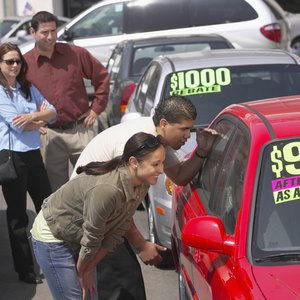
Paying off your auto loan or even paying cash for your car doesn't protect your car from creditors. A credit card company or anyone else you owe money to can seize your vehicle if you don't pay your debts. It can also sell your debt to a debt collector who then will try to get the money from you.
Judgment Against You
The credit card company may try to work things out and convince you to catch up on your payments. If that doesn't work, the next step is often to sue you. Most creditors can't take action against you without a judge's ruling that you owe the debt. The company has to notify you about the suit so you have a chance to present your side of the case to the judge. If you lose, the court gives the company a debt judgment against you.
Researching Your Car
As part of the court case, some states require you fill out paperwork listing assets the credit card company can try to seize. If state law doesn't make you do it, the company can have the judge order you into court to answer questions. A third approach for the creditor is just to search the state motor vehicle records and find out if you own a vehicle. A creditor has to know what you own before she can take it.
Using the Judgment
Once the company knows you have a car, it can ask the court for a writ of execution -- though some states use different terms -- to take your car. The company's attorney gives the writ to the county sheriff, who picks up your car and auctions it off. If the sale price is more than you owe, you get the extra. The vehicle has to be somewhere easily available for seizure. If you park it in your garage, the sheriff can't enter your garage without your permission unless the company gets a court order authorizing that.
Drawbacks
Many creditors won't bother taking your car. If you owe anything on the car loan, the lender is paid first from sale proceeds. State law protects you too: In Florida, for instance, your car is exempt from seizure unless it's worth more than $1,000. If it's worth more and there's no car loan, you're entitled to get the first $1,000 from the sale. Judgment liens don't expire for years, so the creditor may be better off waiting until you have more money and property to seize.
References
Resources
Writer Bio
A Durham, NC resident, Fraser has written about law, starting a business, balancing your budget and fighting evictions, among other legal and financial topics.
